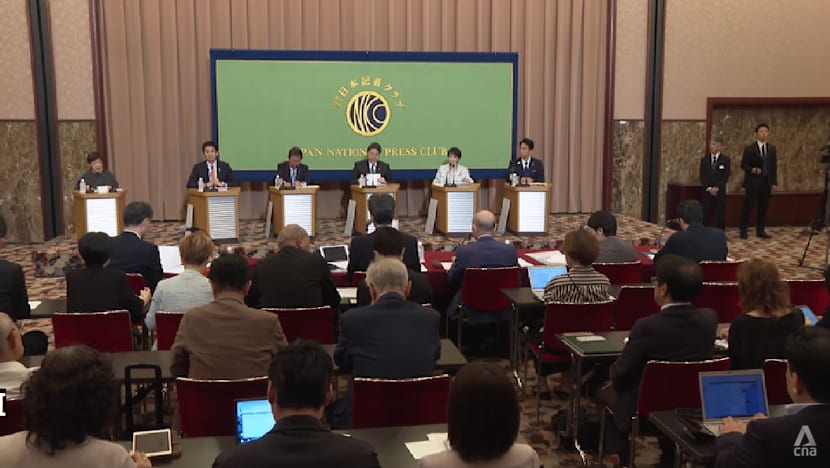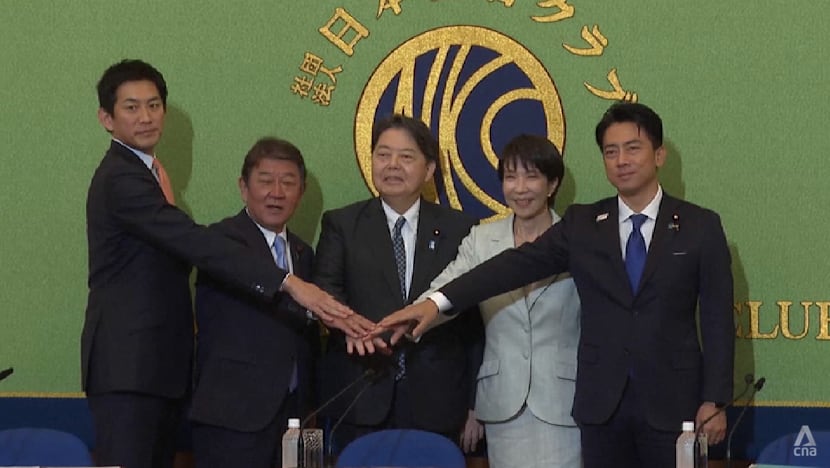Japan’s ruling party race heats up as candidates spar over economy, foreign policy in closely watched debate
Analysts noted that in past races, performance at the Japan National Press Club debate influenced rank-and-file Liberal Democratic Party votes.

Five contenders vying to succeed Prime Minister and party president Shigeru Ishiba faced tough questioning on policy issues at a closely watched debate at the Japan National Press Club in Tokyo on Sep 24.

This audio is generated by an AI tool.
TOKYO: The leadership race for Japan’s ruling Liberal Democratic Party (LDP) is heating up as campaigning gets underway.
Five contenders vying to succeed Prime Minister and party president Shigeru Ishiba faced tough questioning on policy issues at a closely watched debate at the Japan National Press Club in Tokyo on Wednesday (Sep 24).
The party’s presidential election is set for Oct 4, following Ishiba’s resignation earlier this month after a series of bruising election losses.
The leadership contest for Japan's ruling party kicked off on Monday.
The 12-day campaign features several debates, with the National Press Club session seen as the most challenging, as candidates field questions from rivals and veteran journalists.
Analysts noted that in past races, performance at this debate influenced who rank-and-file LDP members voted for.

ECONOMY, COST OF LIVING ISSUES
During the debate, candidates focused on the economy and rising living costs. But foreign affairs also took centre stage — particularly Japan’s ties with China.
Tokyo has been critical of Beijing's growing assertiveness in the East China Sea and South China Sea, with contenders underscoring the importance of the US alliance in countering it.
“For the US, China is the biggest challenge,” said candidate and former top diplomat Toshimitsu Motegi. The 69-year-old has built a reputation as a tough trade negotiator.
“To face (China), we have to demonstrate Japan is the most important partner. We have to show we are willing to work together.”
Another candidate, former economic security minister Takayuki Kobayashi, voiced concern over anti-Japan sentiment in China.
“I am really worried about the protection of Japanese residents (in China). They live in 30,000 locations,” said the 50-year-old.
“There are 100,000 Japanese. There are Japanese detained. I believe such risk will continue.”
FOREIGN POLICY AND RECOGNITION OF PALESTINE
The candidates were also pressed on their views regarding Palestinian statehood, amid recent moves by Western nations to recognise a Palestinian state.
Japan is not among the more than 150 United Nations members that recognise it as a sovereign state, though Ishiba has said it is a matter of “when” rather than “if” - a point echoed by some party presidential candidates.
“It’s about when we will do it,” said 64-year-old Yoshimasa Hayashi, the top government spokesman in Ishiba's Cabinet who has a wealth of ministerial experience.
“We moved one step forward. There are countries that have done it. We will watch if that has led to a good result.”
Agriculture minister Shinjiro Koizumi - one of the top favourites to succeed Ishiba, according to media polls - was more cautious.
“If I become prime minister and (party) president, I will be sure to be briefed in detail on international affairs for comprehensive decision-making,” said the 44-year-old.
Another frontrunner, former economic security minister Sanae Takaichi, criticised Ishiba’s foreign policy record.
“The security environment around Japan is extremely severe,” said the 64-year-old, who lost to Ishiba in the previous run-off.
“We are in the front line of nuclear states. They are all our neighbours. We have to be able to defend ourselves,” she added. “On Japan’s diplomacy, its presence is weakening.”

















